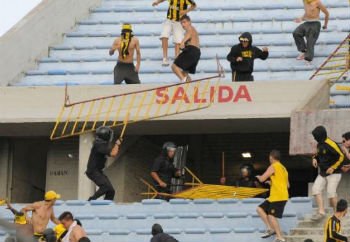A high-level soccer official in Uruguay said recently that the country’s organized fan clubs have begun operating like criminal organizations, indicating the evolution of these so-called “barras bravas” mirrors that of their counterparts in neighboring Argentina.
The barras bravas “have transformed themselves into true cartels that even fight for [control of] territory and the criminal activity they are involved in,” said Rafael Peña, head of security for the Uruguayan Soccer Association (Asociación Uruguaya de Fútbol – AUF). Peña made the remarks during a hearing before Uruguay’s Parliament in early February, reported El País.
The soccer official explained that the barras bravas act like a “typical organized crime structure” because they both maintain logistics, codes of conduct and a hierarchy for making decisions. He said the barras frequently rely on extortion. AUF Vice President Edgar Welker testified that even the soccer clubs are being extorted by the barras bravas.
Peña said the AUF is working with authorities in Montevideo to cut off the bravas’ revenue from parking concessions, which he called an “enormous source of income” for them. However, less than a month later, Peña said the responsibility for confronting these groups ultimately fell to the judicial system.
The problem of the barras bravas “will not be solved by the Uruguayan Soccer Association, nor by any civil organization,” Peña told El País in early March. “Rather, this task must be handled exclusively by the police and the justice [system].”
InSight Crime Analysis
Peña’s description of the barras bravas in Uruguay, if accurate, would parallel the type of evolution seen in the barras bravas of soccer-mad Argentina.
In the 1970s, Argentina’s barras bravas were comprised of die-hard fans who wanted to show their loyalty to their favorite team by dressing, chanting and singing in unison. But by the 1980s, the bravas “began to characterize themselves by violence,” Argentine sociologist José Garriga told InSight Crime in 2013, until “it became what defined them.” They eventually became involved in money-making schemes similar to the ones that Peña said are now occurring in Uruguay. Some bravas in Argentina even have links to the drug trade and count on political cover to shield them from prosecution.
SEE ALSO: Coverage of Soccer Crime
In response to the growing threat, President Mauricio Macri ordered the creation of an elite force to crack down on the barras bravas shortly after his election in November 2015. Macri’s administration has also established a registry for each of the country’s fan bases in order provide the authorities with more information about these groups.
It may only be a matter of time before Uruguayan authorities are forced to take similar measures to counteract the country’s barras bravas, as Peña insisted they must.

